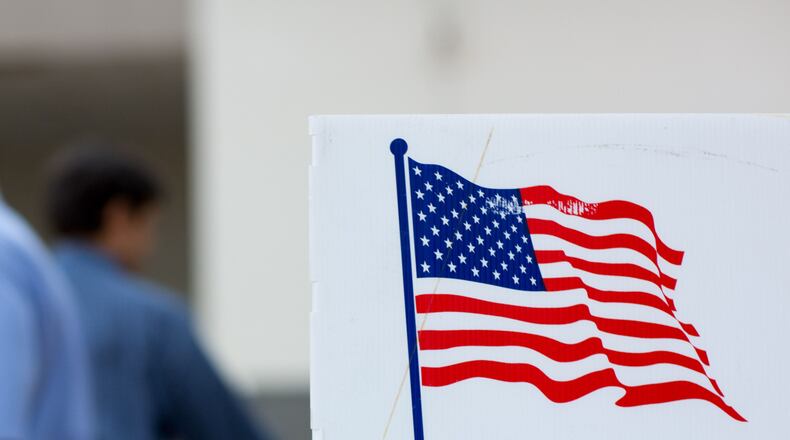Early voting begins Monday, and many candidates on the runoff ballot have a simple approach: They are trying to reach out to every voter who backed them in May. With low turnout expected for the July 24 runoff, getting those supporters back to the polls could be enough.
Over the next three weeks, the candidates will bug, beg and bombard their core supporters with phone calls, mailers, TV ads and in-person visits to try to drag them back to the voting booths. It won’t be easy. They’re competing with summer heat, vacations and voter apathy after a bruising May primary.
That’s already playing out in the highest-profile race on the ballot, as both Lt. Gov. Casey Cagle and Secretary of State Brian Kemp lace into their speeches a reminder that, yes, there is another vote to decide the GOP nominee just around the corner.
Both hope an intense voter outreach fueled by a new wave of advertising will help drive turnout. Cagle’s campaign has pumped about $2 million into TV ads, and a pro-Cagle outside group has added an additional $500,000. Kemp has snapped up roughly $1 million worth of airtime.
It’s even harder for down-ticket candidates facing tough runoffs. The GOP ticket features races for lieutenant governor and secretary of state. And Democrats will decide their nominees for schools superintendent and two congressional seats in suburban Atlanta.
In those races, candidates are hungry for attention. Kevin Abel and Lucy McBath, who are competing for the Democratic nod in the 6th Congressional District, implored voters during a spate of debate appearances to cast ballots.
And former state Rep. Geoff Duncan, who narrowly won a spot in the GOP runoff for lieutenant governor against state Sen. David Shafer, has tried to rev up his voters by trying to seek anonymous tips about his Republican rival.
Voters may treat all these efforts with a collective yawn.
“The excitement is not where it should be, and for this election, the voters seem to be confused over the candidates,” said Dianne Putnam, a longtime Republican volunteer in Whitfield County. “Surely, the people will realize why this runoff is important. But unfortunately, there’s a lot of uninformed voters.”
Topsy-turvy
The last runoff for governor in Georgia shows just how volatile those contests are.
Ex-U.S. Rep. Nathan Deal finished the 2010 GOP primary for governor in a distant second place behind Karen Handel, a former secretary of state. But after a bruising runoff phase, Deal won the nomination in a squeaker, helped by lighter turnout: Roughly 100,000 voters who cast ballots in the primary skipped the runoff.
Cagle, who has been preparing for his run for governor for a decade, is trying to avoid the same fate by working to persuade his biggest fans to return to the polls.
He’s relentlessly courted supporters of President Donald Trump with a round of new TV ads. He’s ramped up attacks against Kemp, whom he frames as an ineffective bureaucrat. And he brought former presidential candidate Steve Forbes to Atlanta to highlight his pro-business chops.
“We’re spending volunteer time making phone calls to voters who are predisposed to our campaign,” Cagle said. “We’re telling them we’re a campaign that’s about issues, a proven track record that will continue to lower taxes.”
Kemp’s campaign has tried to cast a wider net by aggressively appealing to supporters of Clay Tippins and Hunter Hill, two former rivals who are at the center of a secret recording that rocked the race. In the recording, Cagle told Tippins that he backed legislation that was “bad public policy” to undercut Hill.
While neither Hill nor Tippins has endorsed any candidate yet, Kemp sees their supporters as new recruits to help “grow and energize our grass-roots army.”
As the two Republicans scrap, Democrat Stacey Abrams has leveraged the nine-week runoff to raise campaign cash — and raise her profile. She appeared last week on late-night TV and has tooled her message around public school education and expanding Medicaid.
As for the candidates on the ballot, they’ve got their work cut out for them. Take it from Melinda Schneider, a veteran Republican organizer in Liberty County who fears many voters will snooze through the July vote.
“I’m not seeing excitement at all,” she said. “It’s hard to get people enthusiastic in the middle of the summer. There’s a lot of people who are just unaware.”
2018 campaign
The Atlanta Journal-Constitution is covering the issues and candidates in a busy election year. Previous stories have focused on topics such as gun rights, immigration and tax policy. Look for more at PoliticallyGeorgia.com as the state approaches the next political milepost, the July 24 Republican runoff for governor.
About the Author
Keep Reading
The Latest
Featured




